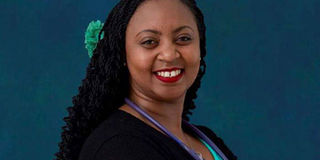One on one with rheumatologist Angela Migowa

Angela Migowa is a consultant paediatric rheumatologist at Aga Khan University Hospital. PHOTO | COURTESY
What you need to know:
- I believe children are our future, and what better way to ensure the prosperity of our nation than to invest in their well-being?
- I chose this career because I felt I needed to share the knowledge I received from my teachers, and also to mentor other healthcare providers.
Dr Angela Migowa is a consultant paediatric rheumatologist at Aga Khan University Hospital.
She is skilled in emergency medicine, public speaking, healthcare management, and leadership. She is also an assistant professor of paediatrics and child health at Aga Khan University. She is passionate about mentorship, leadership and research.
How come there are such few paediatric rheumatologists in sub-Saharan Africa?
This specialty is not widely understood by many and so there are many misconceptions about what it entails.
Many assume that ordinary rheumatologists can also treat children, which is not the case. Furthermore, the discipline is also not considered as lucrative as other medical specialties.
The hunger for huge profits by hospitals and training institutions leaves a huge gap that subjects children suffering from arthritis and related conditions to repeated cases of misdiagnosis, prolonged suffering, and deformity in some cases.
Lack of adequate funding to support training in paediatric rheumatology and poor access to training centres also contribute to its low exploration.
What are the key challenges in Kenya’s healthcare system?
In this discipline, it is highly important to make correct and timely diagnoses.
However, this is not always the case because most patients get referred to us quite late, either after prolonged suffering or with advanced disease progression.
So many parents of children who suffer from arthritis do not have the necessary financial resources to cater for clinic visits, investigations and management.
Cultural perceptions about paediatric rheumatology are also a challenge. Many societies in Kenya believe that rheumatic diseases are caused by witchcraft or bad omen.
What interests you about paediatrics?
I believe children are our future, and what better way to ensure the prosperity of our nation than to invest in their well-being?
I love children because they exhibit pure serenity, gratitude and authenticity. Additionally, chronic childhood illnesses have led to fragmentation of many families. As doctors, we have a moral obligation to care for these children.
Why did you take up teaching? Is it something you always wanted to do?
I chose this career because I felt I needed to share the knowledge I received from my teachers, and also to mentor other healthcare providers.
I love teaching because knowledge is one of the few things that when shared, can multiply exponentially.
To what do you attribute your success so far?
I remember spending a lot of time reflecting on ways of ensuring that my ambitions were not selfish. I learnt a lot from experts and mentors in my field.
I always purpose to build strong networks and engage with those I serve so as to better understand and meet their needs.
What advice would you give to an aspiring rheumatologist?
I would tell them to follow their passion, and that their greatness lies in service to others.
I would tell them that if they lift others up, they will be uplifted too. That as long as they live, they remain eternal students of life.
Therefore, they should be ready to learn from everybody irrespective of age, gender, creed or status.
I would tell them not to despair when faced with challenges. Instead, they should keep their eyes on the goal, which is to serve humanity.
I would also encourage them to develop resilience and humility.
What do you think is the greatest misconception about your field?
That rheumatic diseases only afflict the old, and that such diseases don’t even exist in our country or continent.





